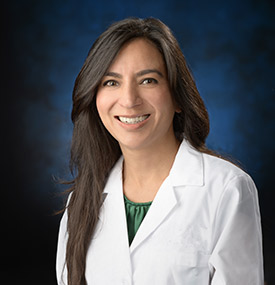Clinical trials offer hope for ALS patients

When UCI Health neurologist Dr. Namita A. Goyal was starting out at Massachusetts General Hospital in Boston in the mid-2000s, she was upset to see young, otherwise healthy people diagnosed with amyotrophic lateral sclerosis (ALS), a fatal neurological disorder that gradually robs a person of the ability to walk, speak, swallow and breathe.
“It was just devastating to watch healthy, well-muscled patients decline every few weeks,” she recalls.
That’s why Goyal, co-director of the UCI Health ALS & Neuromuscular Center, has devoted herself to slowing the disease’s progression — and perhaps someday to finding a cure.
There is reason for hope, the nationally regarded ALS researcher says, citing a dozen ALS clinical trials currently underway at UCI Health and the UCI Alpha Stem Cell Clinic (ASCC).
These include three potential treatments that are in phase 3 studies — the last stage of testing before U.S. Food and Drug Administration consideration for approval.
A new era in the fight against ALS
“This is a new era,” says Goyal, noting that the number of drug trials for ALS has never been greater. “I’ve heard from many patients that their neurologist or someone else told them they should get their affairs in order, but our message is very different. I talk to them about how we’re going to fight this tooth and nail.”
One potential therapy under study is Amylyx Pharmaceuticals’ drug AMX0035, which has shown promise in slowing functional decline in early phase trials.
“ALS is thought to be very complex, a potential interplay of many different mechanisms — oxidative and mitochondrial stressors, inflammation, cell signaling, metabolism, protein mishandling — possibly one triggering another and becoming a vicious cycle, which at the end causes motor neuron cell death,” she says. Patients typically survive two to five years after the onset of symptoms.
AMX0035 — which combines two drugs, sodium phenylbutyrate and taurursodiol — is thought to “block neuron damage and inflammation by reducing mitochondrial dysfunction,” she adds. Mitochondria are the engines that supply energy to cells.
At the forefront of ALS therapies
While the AMX0035 study is not actively enrolling new patients, UCI Health is enrolling participants in an important phase 3b study testing an oral form of edaravone, an existing ALS drug that now is given intravenously to slow the loss of function in patients.
“The challenge with edaravone is that it’s a little bit more invasive to administer — the patient has to get the IV infusion the first month for 14 days in a row,” Goyal says.
Although neither drug promises to stop ALS in its tracks, they may buy patients more time. “Adding months to a condition that now progresses within two to four years is significant,” she says.
Goyal is excited that ALS research is being pushed forward faster than ever as scientists around the world collaborate with pharmaceutical companies, physicians and patients to develop new drugs and target new pathways.
“With all these efforts, we are potentially on the verge of a breakthrough for this disease,” she says. “And we are studying many of these leading-edge ALS therapies right here at UCI Health!”
Learn more about these and other ALS trials underway at UCI Health ›
The UCI Alpha Stem Cell Clinic (ASCC) is the clinical trials arm of the UCI Sue & Bill Gross Stem Cell Research Center (SCRC) and part of a network of the state’s leading medical centers funded by the California Institute of Regenerative Medicine (CIRM). The ASCC specializes in delivering leading-edge stem cell clinical trials to patients and seeks to accelerate the development of treatments through partnerships with patients, medical providers and clinical trial sponsors. The ASCC network supports both CIRM-funded clinical trials and those funded by academic and industry sponsors. Visit www.stemcell.uci.edu to learn more about ASCC, clinical stem cell trials and regenerative medicine research at UCI.





